
Barry Moss was the third-baseman for the 1975 Emeralds until a late-season knee injury sidelined him. He played several years in the minors for Cincinnati, reaching AAA in 1977. He was then drafted by the Toronto organization as they were just getting started, but was unable to make progress there. He eventually was a player-coach for several years, then a manager, hitting coach, scout — all sorts of baseball jobs. He’s still in the game today as a scout and California Winter League Field Coordinator for the Los Angeles Dodgers.
Barry has also appeared in The Natural, and had a speaking part in Moneyball, playing Scout Barry.
Jim Haught You were drafted by the Giants in 1972 in January, then picked up later by the Reds, but in between, you’ve got 1972 and 1974 seasons playing in the Northwest League. But In 1974, Eugene was an independent, and then I guess Walla Walla before that?
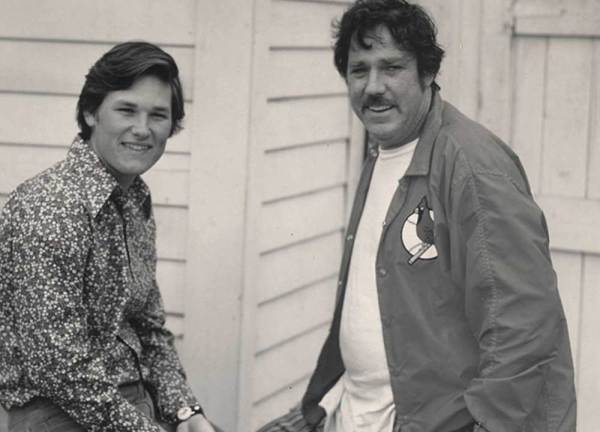
BM Walla Walla was — in those days they had those co-op teams. Walla Walla was actually owned by Bing Russell, Kurt Russell’s father, who was a longtime actor who was in Bonanza and did a number of old Westerns during that 1960s era. And he owned the team. He owned part of the Hawaii team also. And so the uniforms were sent over to Walla Walla, which is, you know, in the middle of the desert in Eastern Washington. And we were called the Islanders, because they had the uniforms and didn’t want to buy any new ones. So we got the old AAA uniforms from — who knows? A year, two years, five years before. And so that was the team.
And on that team were, I think, five Giants players, and I believe we had a couple of Angels players as well. There were a couple of Japanese players, so it was a variety of different organizations — and then independent players also.
So I was drafted in January, played at Pierce Junior College, and then was signed in June and sent there. I guess I was only 18 years old, so I don’t know why they put me in the Northwest League; I never did get that straight.
But we had a whole bunch of outfielders that were going to go to Great Falls in the Rookie League for the Giants, and they wound up sending them to Walla Walla. And then I played quite a bit of first base there also. So that’s how I wound up there. Then I went to the Arizona Instructional League, and I was looking to be a pretty good player there for them.
And then, trying to build my arm up and throw better, I came up with a pretty good tendinitis situation, so they shut me down in spring training and then for the 1973 season, and then let me go.
JH So that explains why there’s nothing for you in the records for 1973 – it was a bum arm.
BM Right. So no, I didn’t play. So then in 1974 they had the Northwest League putting in some independent clubs. One was Eugene, which was a co-op. They had Reds and Phillies and I’m trying to remember, they had another couple players in there, and independent-league players that they had just tried out.
And so I had gone to try out for them, and made the club, and then played there. And at the end of the 1974 season, the Reds came in. They had to move out of Seattle, where they had been. I believe that at that time the Mariners were coming in. They had been the Pilots for a year, and then left. And Seattle came back in the Northwest League — I believe it was 1972-1974.
And then the Reds moved into Eugene and took it over as a Northwest League club. And in that deal, they purchased my contract, George MacPherson’s, and Mark Lucich’s, and John Harrison’s. So four of us were all picked up, and became Cincinnati Reds, and then all wound up playing [in Eugene] in 1975.
JH So there wasn’t any kind of a tryout situation — you didn’t have to go through all that mess with the Reds?
BM No, they took us right at the end of the season. I believe at some point they purchased the Eugene franchise. I think the ownership stayed the same, but Eugene came in and made a Working Agreement with them, to take Eugene as a Northwest League club, basically moving out of Seattle.
But in any event, Seattle was then out of the league. And we were a Reds team exclusively for 1975, and then many years after that.
I had been on the draft list by [Reds scout] Larry Barton Jr. He was the area scout for Southern California. And I had played on the scout teams for him. And so when I had been let go by the Giants, he was real interested in helping me out. He recommended me to go up to Eugene and try out for the club. So by the end of the season he had recommended me, and Greg Riddoch — I played against him. And I even played some third base that season, and he was coaching third for the Reds club in Seattle.
We got to have some exchanges over there, and got to know each other, as much as you would a third-baseman to a third-base coach. So I didn’t know anything was going to happen, and all of a sudden I got a phone call: the four of us had all been picked up by the Reds. So that’s how that started.
Then we went to spring training. John Harrison and George McPherson made the AA club; that was in Three Rivers. I stayed back and played in the extended program. We played at the Mets’ complex at St. Petersburg. Played about 40 games between the end of spring training and the June draft.
And then they pulled both George and John Harrison back from the AA club and sent them to Eugene. So the four of us all wound up back on the Eugene club for 1975.
JH Just to touch on the co-op thing for a second: how was that, playing on a co-op team? I’ve heard some horror stories about it being kind of a mess; that you’re getting mixed messages from different organizations and that kind of thing. Or were you just looking at it as well, at least I have a chance to play?
BM For me it was just, you know, good. I got a chance to play on a pro team and they picked me, kind of. The manager was an old local fellow named Hugh Luby, and his pitching coach, Joe Verbanic, who became the manager of the club – because Hugh was just supposed to get things set up and started. And then about two or three weeks into the season, Joe — who pitched in that Yankee organization — became the manager of the club and ran it the rest of the way.
It was good, because we won; we wound up winning the league championship. We beat the Dodgers, who had Pedro Guerrero and Jeff Leonard and Rick Sutcliffe, and some pretty good guys who went on to be major-league players and good ones.
And we beat them. We beat them in a two-out-of-three playoff. So that team was great. They ran it well; it was very well structured. Eugene had been a AAA franchise with the Phillies, when they had Greg Luzinski and Mike Schmidt — all those big guys — right before that. Then they — I don’t know whether the Coast League kicked them out or what, but they then they dropped and didn’t have a team. And that’s how they became a co-op team in the Northwest League.
And so they were good fans and they kind of liked us, even though we weren’t AAA players that they were used to. But you know, we were a good team, and from the beginning we won and then wound up in a playoff with Bellingham, which was the Dodgers team, and won that thing two out of three.
For me it was just a chance to play, and hope somebody would — I wrote letters to every organization during the season, explained that my arm was 100 percent. I was playing four positions, and so I was working it. It paid off, because I guess I made a good-enough impression on Greg to add me to that list of fellows they took.
JH How much different was it, playing for a single organization in 1975 going forward? Was it a big difference playing for the Reds as opposed to a co-op team?
BM Oh yes. At that point, I guess I’d played for two [co-op teams], even though I was in an organization in 1972. But you know, I was 18 years old [in 1972]; I didn’t know the difference. All I knew was, I was in a pro league and I was over my head a little bit that year, but I got to play regularly and I was a centerfielder, playing over a couple of guys who had been signed and played for other organizations. And so it was all good for me.
And then I went from there to the Arizona Instructional League and I was in the Giants prospect system for that. And that’s kind of where I got my arm overdone and it never got back in shape for spring training.
So in any event, I was only 19 or I was 20 when I got to 1974 — and still was plenty young enough to be resigned, and to try and get another shot at it. And that’s how it worked out.
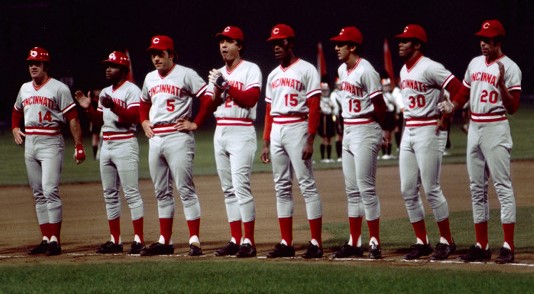
But going from any club or co-op or organization to the Reds in those days was a huge deal, because the Reds were very structured and tough on rules and regulations. You had to have short hair; no facial hair at all. And the uniforms had to be worn like the old Reds. We had to have our stirrup socks down where you could hardly see the white sanitary under the stirrup. And the leg, the pants wouldn’t go down below your shin. And we were the Cincinnati Reds, and had to be in that same tradition.
And they were so structured that we had the same signs — the offensive signs of bunting, stealing, hit-and-running, and the defensive signs for throwing down to second or defensive positioning. Things like that were the same from the major-league level all the way down to the Rookie League. So I mean, that’s how structured they were.
JH They had The Reds Way.
BM Even to the extreme. They had to learn that if the ball went to right-center or over the centerfielder’s head, if the ball was going to be fielded at the wall — and the term that they gave us was, if you see the center fielder or the right fielder’s numbers on his back, the shortstop has to go out to get the relay because that’s how they did it in the big leagues. Because [in the big leagues] they had Davey Concepcion at short, with the better arm than Joe Morgan. So whenever there was a relay from the outfield, it was always Concepcion to be the first guy out to get the relay throw. So they had to teach everybody in the organization to follow that same thing.
I think they left it up to the managers at some point, because I know we didn’t do it that way every single time. But I remember that being a big deal in spring training, and we were all taught that; we all had to drill on it, and all that.
And the Reds had a thing where before the pregame infield, we had the full cutoffs and relays done. I mean, we didn’t just throw to — left field, throw to second base and then home, and center and right to third and home — we had to do the whole relay thing, with the infielders going out and the first-baseman cutting across, and all that.
So, I mean, it was just an unbelievably structured organization, and I was in it six years.
It was a great way to learn and to be drilled on how to do things correctly. And to play on a Reds minor-league club, that was huge — and everyone in the league knew it. I mean, when we played even the Dodgers, we played Oakland, and the Padres were in that league, and all that. And they’d almost make fun of us because we were so — all looked like, you know, we were in the military or something, with short haircuts and the same uniforms. And Oakland, even in the minors, those guys had mustaches. [laughter]
JH But there were a lot of those guys who later wished they had been a part of that.
BM I think so, yeah. And I had quite a few friends that I’d played against, and then we went up the ladder together with our organizations, and they were always saying, jeez, we were almost afraid of you guys. We weren’t allowed to talk to any of the other players. There was no fraternizing on the field or anything. A few guys who had played college together couldn’t even say hi to each other in the outfield. So it was structured, Jim.
The 1975 season
JH As you look back on 1975 now and Greg’s role in that, do you have a different view of him now that you’ve spent so many years in the game, than you as you did when you were a kid playing for him, about how he was as a manager and what all he meant to that team?
BM Well, he became my mentor. I had watched his team play in 1974 and like I said, we were — other teams looked at the 1975 team like, geez, this is the real Cincinnati Reds, practically, playing.
We were so structured and down to detail and everything on all our practices and infield sessions at batting practice and all that. So I had seen that already, and liked it. You know, it was like, geez, I wish I could be on the Seattle Reds team, instead of this Eugene club, even though we were good, and I was having a great season in 1974. But I mean, I had seen how Greg operated and I realized that he was running what the Reds’ program was.
But he was very involved in every game, and we did have some exchanges from third base to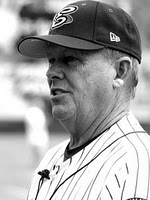 the third-base coaching box during games or timeouts, and things like that. So I knew he was a good guy. And I thought, gee, what a great guy to be playing for. And lo and behold, I wound up playing for him the next year.
the third-base coaching box during games or timeouts, and things like that. So I knew he was a good guy. And I thought, gee, what a great guy to be playing for. And lo and behold, I wound up playing for him the next year.
So in in the spring-training camp, the four of us from the 1974 Eugene team were all there for the first time. And so we got a quick taste of what the Reds were all about as these newcomers. And they made sure that we weren’t gonna be too loose or not go with their program.
And so I ate it up; I knew what was coming, and I was like Mr. Marine: first in line for everything. And so it worked out real well, and they didn’t know where were they should play me, because that was kind of a problem. I had been a real good outfielder before in college, and before I was with the Reds. But when I went to Eugene that year, I wasn’t sure what shape my arm was in. So I had learned to play a lot of third base. And when I got to the Reds, they didn’t know whether I should be playing the infield or outfield, so they were mixing me up quite a bit during spring training.
And then when the teams broke, they said, we want you to go to extended spring and play the outfield. That’s where we had scouted you, when you were an amateur player. So right now we’ve got some draft picks playing third and first and second. So let’s have you go to the outfield so you can swing the bat, and not worry about your defense and all that. So I did.
So I played all three outfield positions for that 40-game stretch. And whatever connection might’ve been in there, it was subtle, but the manager of that team was Jim Hoff. He and Greg had been roommates and best friends – a second-base/shortstop combination all through the minors with the Reds. Neither of them got to the big leagues. But anyway, Greg had recommended me to be signed, and then I was with Jim Hoff through spring training and then that extended program.
And so I’m sure that Greg, knowing he was going to get a lot of those players in Eugene, kept in touch with Jim and kind of got a feel for what kind of guys we were.
I had not played third base during that stretch, and took grounders there during batting 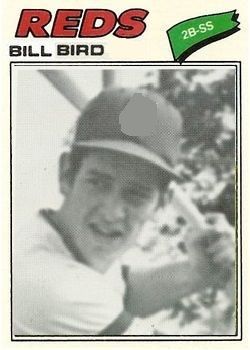 practice, extra time, and things like that. So when we got to Eugene, there was a third-baseman named Bill Bird, who had played in the extended program and they had gotten him from the Cardinals organization. So he was new to the Reds. And so he was going to be the third-baseman in Eugene.
practice, extra time, and things like that. So when we got to Eugene, there was a third-baseman named Bill Bird, who had played in the extended program and they had gotten him from the Cardinals organization. So he was new to the Reds. And so he was going to be the third-baseman in Eugene.
And there was a shortstop, I think that was drafted, who was fairly inexperienced, whose name was George Sucarichi. He didn’t stay on the club, I think, more than a week. I think they sent him right down to the Rookie League.
But we had about three or four workouts in Eugene before we had an exhibition game, and then started our season. So I was put in the outfield, playing right and left at that time. I would take my fly balls, go do batting practice. And then for the last group, when it so happened that Bill [Bird] was hitting, I would go to third and take ground balls there.
And so – and Greg had seen me play third the year before, so he knew I was a third-baseman in pro ball at that level too. And the shortstop was having a tough time there in the camp. And Bill Bird was originally a shortstop. He was supposed to be a Cardinal player as a shortstop, but he wound up behind Garry Templeton, and so that’s how he got bumped out of there and wound up with the Reds.
In any event: Opening Day, I had only been taking ground balls during fungo sessions in batting practice. And we’re getting our uniforms, and it’s a small locker room and all that. And so I had my locker and my uniform, and I’m looking at it and making sure it fits right and all that. And I never saw Greg. And I hear this voice, like a tap on my shoulder, and just a voice. And I looked back, and he’s not even looking at me; he’s looking off to the side. And he goes, you’re playing third base tonight. So I went, okay, great.
I hadn’t been involved in any of the rundown drills or the relay drills or any of that [stuff] that they had been working on so much. Even though it was like a five-day camp, I mean they drilled us excessively, and I was working in the outfield.
But I was ready, and knew the system, and all that. So I played third base every game the whole season until I got hurt with three games to go in the season. But I played third base the whole season. [laughs] Nothing was ever said again.
They’d sent that kid down to the Rookie League. They moved John Harrison in to play second base. Bill Bird played shortstop the whole season. And they had Tommy Watkins, who played some second base, but he wound up playing mostly in the outfield. And that was our club. I mean, from the get-go, we didn’t really make any other roster moves, I don’t think, other than a couple of catchers came in and out. And pitchers, of course.
But you know, our club was pretty well set there. And George McPherson showed up and played right field, and then they sent another fellow, Lynn Jones, down from the AA club; Lynn played left. And I mean, we had good players at every position, and a couple of real good ones on the bench [who] could have been playing on other clubs, I’m sure.
And everything came together from the get-go and we just rolled over everybody.
There was one point during the season where the manager felt the club needed an attitude adjustment. And he was not shy about letting his feelings be known:
BM With about two series to go, we were out there early for batting practice in Boise, Idaho. And that was the A’s club, and we had pretty much knocked them around all year. And the players — typical end-of-the-year stuff, they’re talking about flights home and meeting up with girlfriends, and hey, this guy, these two guys live in California; they’ll drive back together and those two guys live in Texas, and they’ll drive back together.
And so Greg had heard this stuff going around, and so he was pissed. And you know, he can put on a pretty good show; I think you’ve got a feel for that. [laughter]
But he was not happy about this; he had a great team, and guys that were all getting along, and he was getting along with everybody, and we followed all the rules and we looked good out there, and everything.
So we were supposed to have batting practice, and the other team had hit first, which is the way it works: the home team hits first. So they cleared the field, and we’re supposed to — we’re all with our helmets on and bats in our hands for the first group, and the others are getting ready to go out to the field. And he says, all right, everybody in right field.
And he comes walking out to right field, holding a folding chair over his back. And he’s coming at us, and we’re not — we don’t know what’s going on. We’re all ready for batting practice.
And so he says, all right, everybody sit down; get on a knee. And he puts that chair down and sits in the chair and says, all right, the shit has hit the fucking fan —
JH Whoa!
BM — which got our attention, one and all. And he said,
You guys, I don’t know who you think you are, but you guys are good, and you got a good chance at something real big happening here, but you’re going to throw it all away. And I’m not going to sit here and watch that happen.
You guys want to set up your rides home, and you guys want to go see your girlfriends, you just come up to me as soon as we’re done here, and I’ll send you there. But if you want to stay here and win this championship and play baseball like you’re supposed to, you better wise up and get with the program until we’re done; because we’re not done.
He just kept going; I mean, that was the start of it. In those days, you didn’t really call out players’ names in a big meeting like that. [But] I think he picked out every guy and came up with something that they shouldn’t have said, or said [that] didn’t go over good. I don’t know how he knew about all this information, but somehow, he was in on everybody’s conversation at one point or another.
So he undressed us, and we did not take batting practice or infield. And he went on for a good hour sitting there and said, all right, now get in the dugout, get your shit together, and let’s play some baseball and knock off all this bullshit about when you’re leaving and who you’re going with. [more laughter]
And so, we went on and I know we won that game.
Injured in Boise
A key moment in the 1975 season — one that could have derailed the Emeralds’ championship — happened in a late-season game, when Barry suffered a serious knee injury in a collision at third base. A number of Barry’s teammates felt it was a cheap-shot play, but he doesn’t see it that way.
JH You got hurt August 26th at Boise, in the first game of a doubleheader. There’s been a lot of discussion about whether or not it was it a cheap shot. Do you feel it was a cheap shot? How did that all go down?
BM It was a fair play.
I was playing third base, and [shortstop] Bill Bird was unbelievable at throwing behind runners. He would even tell the outfielders to get the ball in on a single or whatever as quickly as possible. And there were times when he would get the relay in and pick the runner off first base who had just hit a single. He had a great arm, and that’s the way he played.
And so there was a play and — I’m trying to remember — I think the runner was on first, and 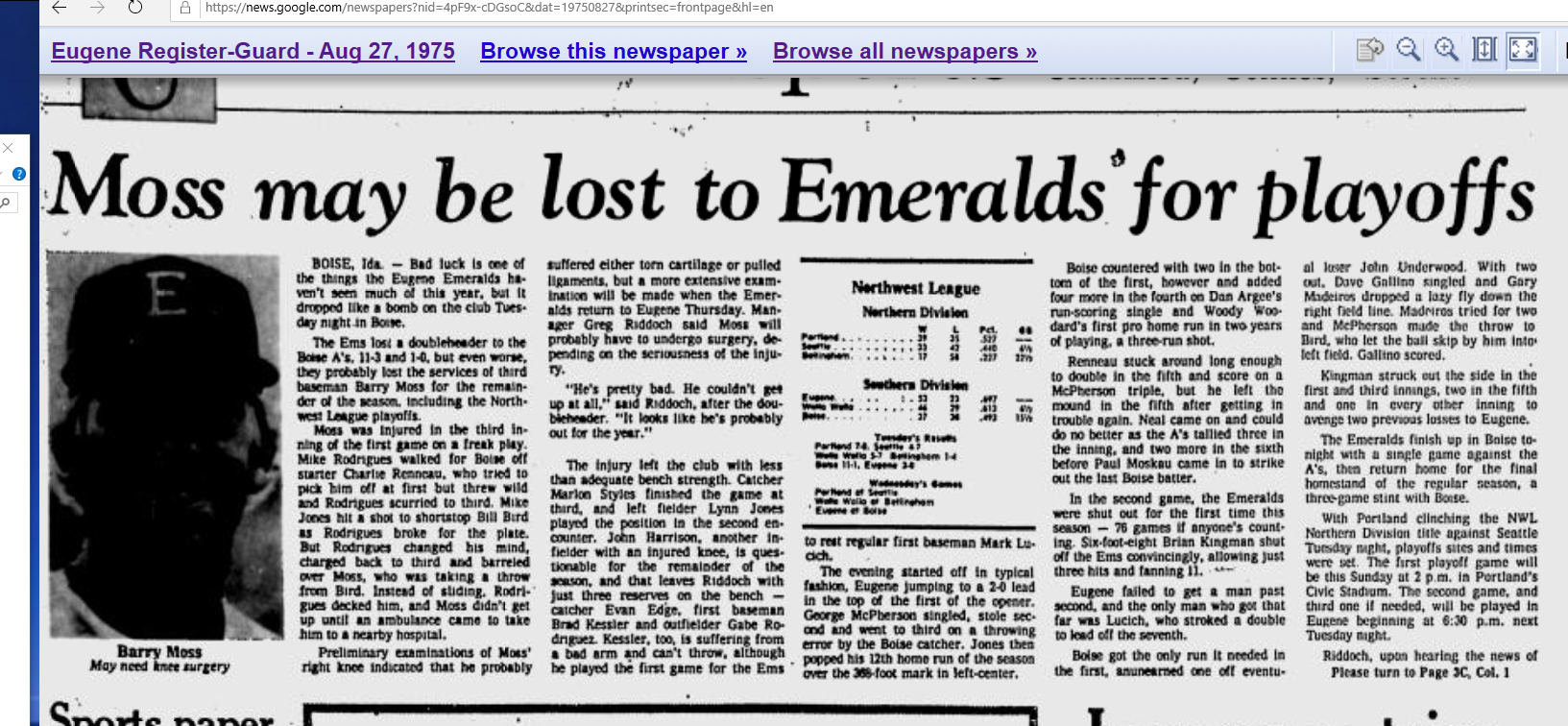 there was a ball in the gap in left-center, and the relay came to Bill, and I knew he would throw to third if this guy took too big a turn — which he did.
there was a ball in the gap in left-center, and the relay came to Bill, and I knew he would throw to third if this guy took too big a turn — which he did.
So he rounded third too far. Bill was ready with the relay, and he was probably 20 feet out beyond shortstop on the outfield grass. And he turned and I was covering the bag, and the throw came with something on it, but it was on the home-plate side of third base. So I had to kind of backhand it and go up the line a little bit just to catch it.
And as I did, here was the runner coming headfirst — because I was blocking — I was on the inside of the bag, and he didn’t have any room, and so he’s diving back for the bag. And I had my left leg on the inside of the base. And I got the full force of him, probably one of his shoulders, just rolled over the knee. And I was down and tagged him out.
Next thing I know, I couldn’t stand up. I didn’t see exactly how he went about diving into me, but he had rounded the bag too far, and I was blocking the base to receive the throw and try to put the tag on.
So it was just a collision. But I didn’t think it was — I wouldn’t say it was a cheap shot. As far as I know, it wasn’t. I was just going for the tag, and he was going for the base.
JH What was the extent of the injury, as it turned out?
BM Well, it was a torn meniscus, so that it moved the kneecap on my left knee. And when it happened, I thought my knee was blown up, and so I couldn’t get up. And so what had happened is the kneecap moved to the outside of the knee on the left side, and there was a slight tear.
So they took me to the emergency room. And I left with — I think that was the last game of the series there, because it was a Sunday — so I went back on the bus with an ice pack on, and then went to see the doctor in Eugene. And he said, okay, we’re just going to wrap this up, and then send you — the season ends next week.
And the Reds had already said [that] if it’s an emergency surgery, then the team doctor would do it in Eugene. Otherwise, go see Dr. Frank Jobe in Los Angeles, because that’s where I lived. And that’s how it happened.
So they wrapped me up, put me on crutches there for the rest of the season. And then I went back to Los Angeles and Dr. Jobe said, you’ve got a tear, but it’s not — at this point, I don’t think we want to do surgery, because you’ve got the whole offseason to rehab. We’re going to go on a six-week program. And gave me a physical-therapy program to go on, which was [where] each day got tougher. So I was running bleachers and tying ankle weights on, and doing every exercise you can imagine.
And I had gone in to see him during that time, but after the six weeks, he said, this is going to be as strong as it’s ever been, and probably stronger than your right knee. So I’m not going to do the surgery, and you’ll be ready for spring training. And so he said, let’s start doing some running times to see how you’re progressing. And so I started running the 60-yard dash and the 100-yard dash.
And they had the scout team — Larry Barton was the main Southern California scout, and he had a team for the pro guys in the offseason. So I would go out to that on the weekends, and he would time me doing the running stuff; running the bases and taking fly balls and ground balls. So that was my rehabilitation program. And then I went to spring training the next spring and made the AA club.
JH So do you feel there was any longterm effect from that, or were you okay?
BM No, I never did have a surgery on it, but I mean, it still gets sore on cold days, and there was a tear there that just, you know, healed. So no, I mean not as far as my playing situation.
JH I mean, that’s the leg you’re going to plant on to hit, and all that.
BM Yeah, I was okay. I mean, I was a switch-hitter, so I had to adjust my stance a little bit. But I wound up — I played a few years in center field, so it really didn’t affect speed or any — certainly not any opportunities for me in development after that. That was — no, it wasn’t a setback.
A different role for the playoffs
BM We wound up playing Portland, which was another independent — an old club. And we wound up facing Jim Bouton. It was a day game in Portland and a night game in Eugene. And 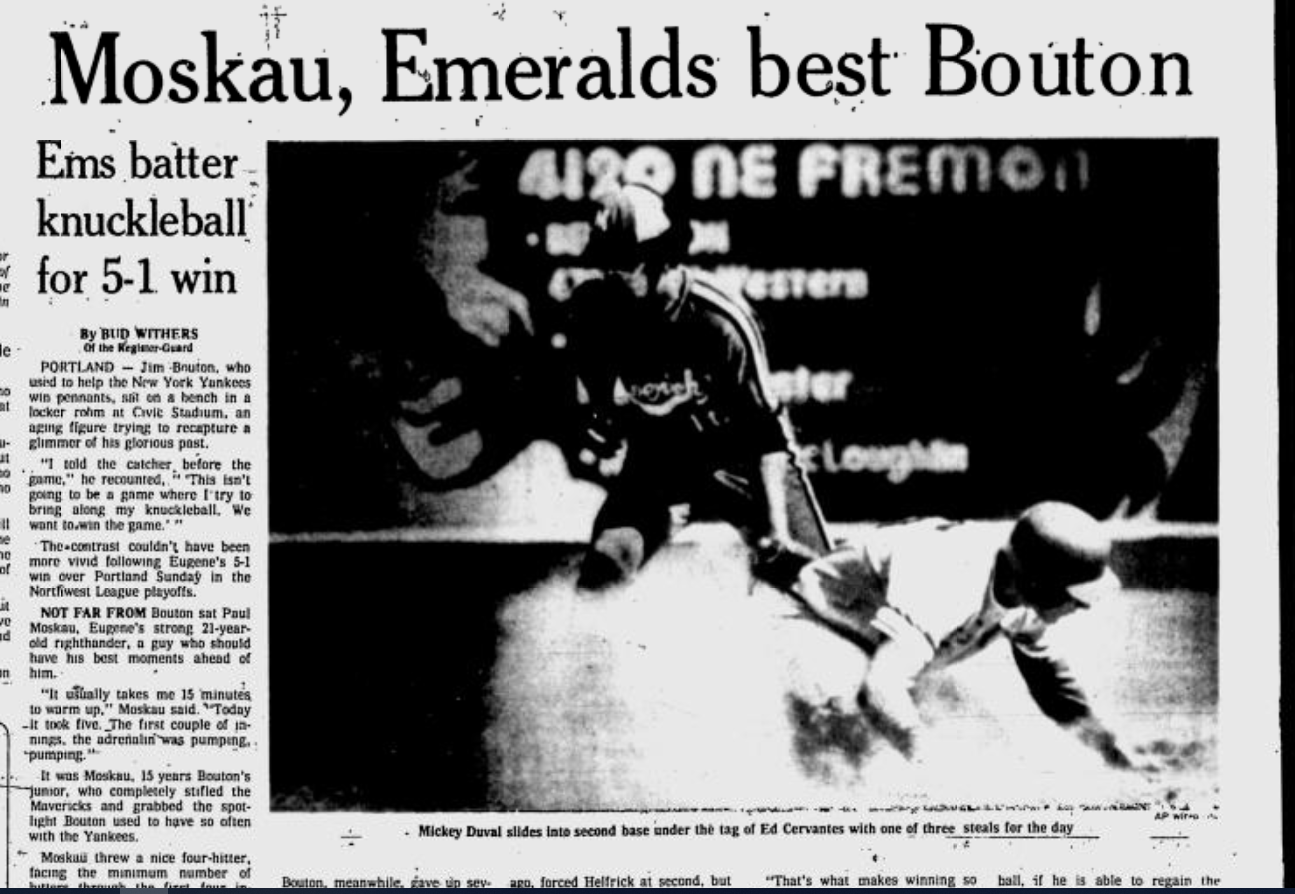 the guy who did the broadcasting — I can’t remember his name — asked me to come up. I had been a broadcast journalism major at Pepperdine in college. And so I had done a few interviews with him, and he let me do a couple of commercials during the season — promos for games and stuff.
the guy who did the broadcasting — I can’t remember his name — asked me to come up. I had been a broadcast journalism major at Pepperdine in college. And so I had done a few interviews with him, and he let me do a couple of commercials during the season — promos for games and stuff.
When I got hurt and I was on crutches there, I couldn’t even get on the field. So for the playoffs he said, why don’t you come up and do the commentary and I’ll ask you questions from time to time? So I was sitting in the press box for those two games: one in Portland and one in Eugene.
Riddoch’s role with the 1975 Emeralds
JH Thinking on 1975 again: do you feel like Greg was in the right spot at the right time, because he’s particularly suited to teach and manage young players? Is that a fair assessment of his specialties?
BM Oh yes, absolutely. I mean, he was overqualified to be managing in the short-season Northwest league, which is basically first- and second-year players and maybe some older Dominican players.
We were very lucky to have a guy who not only knew how to run a ballgame, but taught everything. I mean, he’d been a real good shortstop when he played, so he was great with the infielders. Ron Plaza was the coordinator of instruction for the whole organization, so he would make trips in there, and he did the hitting work with guys. But you know, Greg was on top of everything. If he spotted you pulling your shoulder out or something, he was on that.
You know, for the makeup of the team, we’re young guys. So you get moody and get down when you have bad games or something. But he was always there for each guy individually. And then as the team went, he didn’t let anything ride that shouldn’t. He was on top of everything.
JH When you look now — and you’ve been involved with so many teams — one of the recurring themes about the 1975 team was that the egos were in check, and that everybody was pulling for the other guy instead of being like independent contractors. Is that overstated, or was that a different team that way?
BM I think I played on 12 different teams in the minor leagues, and for different [types of] managers. And I’ve been thinking many different times about why are the 1975 Eugene Emeralds still friends and doing these reunions, and keep emailing back and forth, and guys going into business together and stuff?
And I thought, how many other teams did I play on? And I won four championships on those teams — on other teams. Yet I can’t remember the names of all of those guys. I would remember them if I was told about them and stuff.
But there was never another team in my involvement as a player or a manager or a coach that was so much of a team, and cared about each other. It was weird.
And it all stems from Greg Riddoch. He just made us friends. He made us Eugene Ems. But we just held onto that, and there’s guys like George McPherson, who keeps in touch with everybody; John Underwood, who’s the friend of everybody on the team; and Paul Moskau, the same way.
And then at some of these reunions, my wife is friends with Mark Lucich’s wife, who’s — she’s a great artist, painter. And my wife is a great collector of things that just — their tastes, you know, hit, and they’re Facebook friends. Weird, weird stuff like that, it still lives. And then Greg, when he would come into LA, usually the Orange County area, to see his sister or something, he’d make sure that we knew he was coming.
And it would be John Underwood and Bill Bird, and me, and maybe Paul Moskau would come over from Tucson just to see him. And we’d all have a dinner and everything. And so now Linda, Greg’s wife, made friends with John Underwood’s wife, my wife, Mark Lucich’s wife. They all do emails and all this stuff.
There’s no other real association like that with any other club. And I would say, the closest one is those Trappers guys. They all keep in touch with each other, and it’s just amazing that certain teams will get that kind of a connection with each other, and it’s gonna last a lifetime for a lot of us.
JH That’s one of the amazing things is, these guys who are so tight are from short-season teams. It’s not like they went through 162 together.
BM Yeah! And it wasn’t, like, some unbelievable season, where the team came from last place and won some miraculous playoff. These were good teams that were tough from the beginning, and unbeatable by the end. And those teams, usually everybody moves on to their own careers, and they don’t stay in touch. I mean, I’ve been on and coached many of those. But these two teams, these guys made friends and have stayed friends.
JH Something that I’ve heard referred to about Greg — and maybe a key to why that team has stayed together – is the guys have said that he created this sort of family-type atmosphere, but also he knew where to draw the line between getting your work done and having fun; that he made it fun to play, yet at the same time, everybody got the work done that they were supposed to. Is that a fair thing?
BM Yeah, that’s absolutely right on. And you know, it was 1975; most of us were first-year players. So I mean, for me it was like my third — part of my third year, and yet I was still 21, so it wasn’t like there were guys getting drafted out of college on that team that were older than me. And yet, Paul Moskau and Mario Soto had played in this early half — first half-season.
But this was their first time around, and it was the Cincinnati Reds that was the Marines of baseball. And you didn’t drink; you didn’t miss curfew. And once the team was established as a good, solid club, nobody wanted to get Greg in trouble, either.
So there weren’t team parties, there wasn’t smoking pot, there wasn’t any trouble. I mean, these guys knew if there was trouble, they’d be sent home, which did happen with other clubs in the organization. But Greg didn’t have to be the sergeant-at-arms there. He made it clear what was okay and what wasn’t.
That didn’t stop the manager from pulling pranks on his players, or showing a rare degree of sensitivity to the ups-and-downs of baseball careers.
BM Walla Walla had one place where everybody would go. And it was a hotel lobby. And so we’d be sitting there drinking our Cokes, and Greg would come up, or he’d send a waitress or waiter over and tell six of us that are sitting at a table that we had to move tables; we weren’t allowed to sit at that table anymore. We had to move, and they were going to put us near the kitchen or something like that.
So he’d play these pranks on us, and one of us would go, where is he? He’s pulling something on us here. And so finally the waiter would say, hey, it’s that guy over there in the corner. He’s hiding. So Greg, he’d be part of the gang as far as stuff like that goes, pulling rank and making it a joke. And then he’d come over and sit with us and talk about, hey, we got to – and you know what he would do?
When a guy got released, or sent down to the rookie-league club — there was only one level below us — he would come up and say, Hey, I’ve gotta send — and gee, I wish I could remember their names, but one was the Sucarichi kid, and the other was Keith Halgerson.
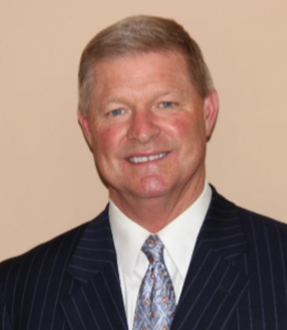
Halgerson was a kid who had been — I think it was his second year in the Reds organization. And he was a big, tall country kid, I think from South Dakota. Pitcher, and pretty good. But you know, it just didn’t happen. He was wild and got passed over there by other, younger kids. And we had some pretty good pitchers on that club.
And so Greg had to release him sometime in the middle of the season, and he called together about probably 10 of us — I mean, half the team — and said. We were on the road, and he said, Hey, listen: after the game, I’ve got to let Keith go, and I don’t want to wait and have him ride the bus all the way back, thinking everything’s fine, and then nail him at four or five o’clock in the morning. So I’m going to tell him after the game, but I want you guys to pat him on the back and to wish him good luck, and be a friend to him. Because he’s been a good kid, good player for us and all that.
And boy, I remember a few of us thinking, Oh no, not him! What a great guy! He hasn’t gotten a chance and we’re trying to talk Greg out of it — and it’s not his decision anyway. But he’s going, I know, you know, look you guys, that’s what I’m telling you and all that. Anyway, Greg pulls him in the office while we’re all taking our showers and packing our dirty stuff up to ride six hours on the bus after the night game.
And so Greg sees him in there, and Keith comes walking out with his head down and holding back tears and all that, trying to hide and get over to his locker. And here was – the whole team by that time had been told — and the whole team surrounded him and one by one, they’re shaking hands with him and patting him on the back.
And then on the bus ride home, I don’t know who engineered it — probably John Underwood — but he made each guy sit with him or made Keith go sit with each guy or something — something crazy where this poor guy was crying the whole way.
And then we kept in touch with him the rest of the season. We’d make phone calls on the road. We just kept him in the loop, and you know, that was from Greg Riddoch. That was – I’ve never seen that again on a minor-league team. And I’ll always remember that stuff.
And I tried to do stuff like that when I managed clubs and coached. There’s still stuff like that that comes back — that it was like, oh yeah, Greg did that. That’s why I remember! You know?
There was something that he had, and he does with people. I mean, he connects, to the shake of a hand. You’re a friend. And with his players and I know, well on past my career, there are guys that, players that played for him that had said the same thing.
If he was still doing it, it’d still be the same way.
Nine years after the Eugene experience, Moss and Riddoch crossed paths again.
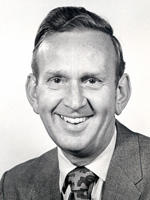
BM Greg came back into my life in 1984. I had finished playing, and I was trying to get a coaching job. And at that time he was the assistant minor-league director and Sheldon Bender was still the minor-league director for the Reds — who had been there for, I think when Greg even played. And then my whole career there with the Reds, and then he was still there then.
And I went to the winter meetings in Nashville that offseason, and had called up Greg and said, are you going to be there? Because I’d like to see you and shake hands with you. I hadn’t seen him for a while, and told him I would be looking for a job.
So as soon as I got there, he had set up a meeting without me knowing about it, with Sheldon Bender and Sal Artiaga, who was the — at that point I think he had moved up from assistant minor-league director to a higher-level role. I think he handled most of the financial stuff. He knew me too, from having been a player in the organization.
We had this meeting, which was an interview that I — they knew me, so it wasn’t like a fresh deal, but I was totally unprepared for a job interview on the spur of the moment there.
But they asked me some questions about coaching and managing in the future, and things like that. And so I got that job on the spot, and became the hitting coach in Tampa, in the Florida State League. And then for the first half of the season, their extended program, which was in Sarasota at the time. So I would drive to Sarasota for their morning games there for the extended, and then back over to Tampa for the night games. And that was my job in 1984, which Greg pretty much made happen.
And during that time, we were meeting and I was in all of the meetings in spring training, and he’d sit next to me and say, okay, don’t talk now. Leave this up to that manager, and let him talk about this. Cause it’s — these would be about release meetings for players and putting rosters together, and if a player wasn’t taking the instruction, they didn’t want this new, fresh coach talking about it. They wanted their team’s manager to do it, and all that. So he trained me on the spot there as to what you say and don’t say, and when you talk and when you don’t talk, and who’s the boss.
And it was a great — it could have been a college education in a three-week spring-training camp for coaching professional baseball. So that got me started.
And then later on, the ownership with the Reds changed. General Manager Bob Howsam left, and Greg moved on to the Padres, and I’m sure you know all the stories about working with Larry Bowa and making good connections over there, which was typical and all.
And then I wind up with — Greg helped me out as a reference, but he was already the major-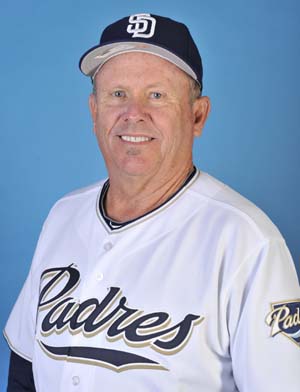 league manager — when I had applied in 1992 to be a coach and minor-league manager with the Padres. So we wound up together in spring training again. And then he was with the major-league club and I was with a rookie-league club in 1992 with the Padres.
league manager — when I had applied in 1992 to be a coach and minor-league manager with the Padres. So we wound up together in spring training again. And then he was with the major-league club and I was with a rookie-league club in 1992 with the Padres.
And you know, first day of spring training, who’s there behind the locker, just as if it was the beginning of that 1975 season? Greg’s standing there, and he was supposed to be out on the field with the big-league club, and he was there to greet me, to say welcome to the Padres, and we’re going to have some good times here this spring. And remember all the stuff I taught you. And off he goes back to the big-league club, and I’m standing there in the locker room, and all these other minor-league coaches are kind of looking at me like, Oh fuck, who’s this guy? [laughter]
Which, you know, he knew. I mean, he knew exactly what he was doing. So in any event, I wasn’t on the big-league staff, but during spring training, he’s taking me out to eat, talking to me at the hotel, and he was a mentor — a great guy. And I was kind of his blood, you know, from way back when.
Greg had done great there with the Reds, even though in many cases he may not have been the first choice to be the manager. Jack McKeon picked him when he was fired [as Padres manager], and they asked him, well, who should we hire? We’re going to keep you as the general manager. Because Jack McKeon was doing both jobs: manager and general-manager.
So he said, Greg Riddoch is your guy. Don’t go back to Frank Howard. And they had some other, older guys on the coaching staff, and he said, Greg is your guy. And that’s who they hired. And then Jack McKeon left — I don’t know whether by his choice or not — but when he left the Padres, Greg was still the manager, and Joe McIlvaine became the general manager.
And Joe was a smart baseball guy. He’d been with the Mets. And so he came up to Greg and 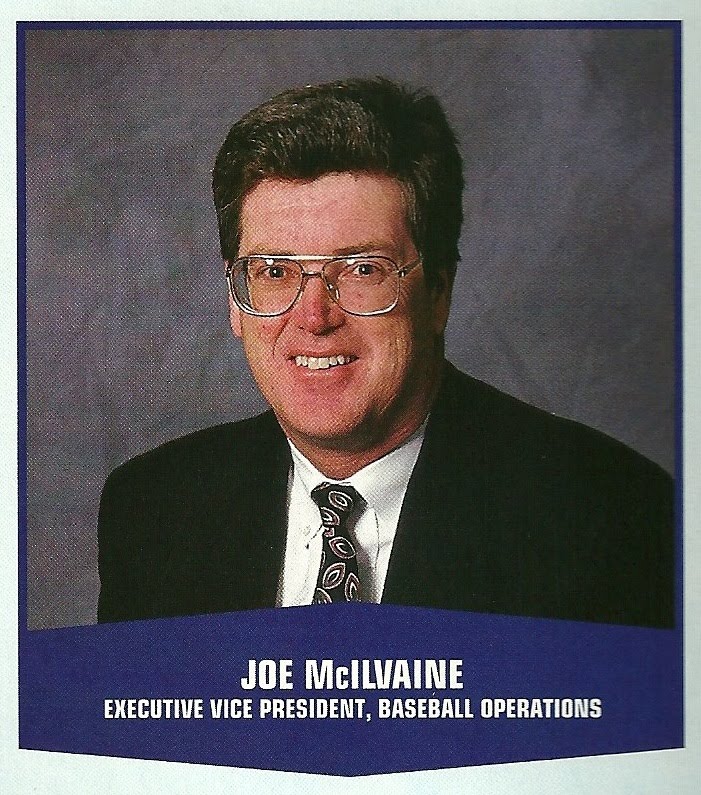 said, Hey, you know, I want us to have a real good relationship and we’re going to be part of the Padres’ future for a long time. And they’re giving us a lot of money to get some better players.
said, Hey, you know, I want us to have a real good relationship and we’re going to be part of the Padres’ future for a long time. And they’re giving us a lot of money to get some better players.
And so that team in 1992 had Gary Sheffield and Tony Fernandez and Fred McGriff, and that was a pretty good club. And it had won 87 games, I think, the year before. Of course, Gwynn was on the club too. And so they had a really good club going right into August and September.
And one of the other owners came up to Greg before a game; Greg was in the dugout, and he walked up. No one else was around. And he said to Greg, you guys don’t expect to win this pennant and Series, do you? Cause that’ll cost the whole owners here a few more million dollars. We aren’t going to be paying all these guys big, huge salaries next year. So you might need to back off – half joking.
But then within a week, there were Craig Lefferts, I think — was he was one of the pitchers who was having a great year, and he was traded. And some key players were traded or told not to play or something like that. And Greg didn’t make a big deal about it, but he wasn’t happy about it. But by the time they fell out of contention, they let him go and brought in Jim Riggleman, who was managing the AAA club in Las Vegas. And so, Joe McIlvaine kind of had his hand-picked guy that way.
Later on, we talked and I said, I thought you and Joe were pretty tight, and I was surprised to see what had come down. And he goes, you know what? Joe was great, and ‘we’re going to be the future of the Padres’ and this and that. And then as soon as he got hired, and got a little juice there, it was like, ‘okay, now stand away. Move over. You’re in my way.’
JH He doesn’t have a whole lot of love lost for McIlvaine, I can tell you that.
BM He said whenever there were meetings or discussions about things, Greg said, gee, we could use this or hey, this guy doesn’t fit in or whatever it was. And Joe said, okay, yeah, I hear you, and nothing would happen. Or another guy would get moved, or something like that. So he said it was kind of a head-scratching, Hey, what happened here? I thought we were this going to be this great team.
And then sure enough, they kind of took him out there right at the end, which was a real lousy deal. So I’m sure Greg didn’t go into too much detail about that –
JH Oh, he went into plenty, believe me!
BM Well, I’m glad he did, because he got a raw deal there and I was in the organization and knew what was happening. I wasn’t in the big leagues right in front of it, but everybody in the organization was going, geez! Everybody loved Greg, and he was the future. And next thing you know, he was packing a U-Haul to drive back to Colorado.
JH He said basically that he felt that that Riggleman was McIlvaine’s guy from the get-go, and that as soon as he got a chance to get him in there, he was going to do it. And he did. And winning record be damned, he was gonna make the change. And he did. And Greg said, look, I wasn’t an insider. I knew it was going to be a short-term deal. But I didn’t expect it to go down the way it did. So yeah, it was —
BM Yeah, that was all very accurate and very surprising to the underlings in the organization. We were all doing our jobs with our different minor-league clubs. I was in Spokane, as a hitting coach that year. I had managed the extended-springs for the first half of the year, and then went up to Spokane. When it all came down, we had just finished our season there, and it was like, what’s going on? They’re trading everybody. And next thing you know, Greg was responsible for the demise of the team, or something.
But then I was with them two or three more years as — managed there in the minors. And then I became a AA hitting coach.
By that time Joe McIlvaine had left, and Ed Lynch had left with him. I was in there with Randy Smith. So I’d gone through a general manager and two minor-league directors during my time there. And the people who were still in the organization who had been there with Greg, would say quietly to me, boy, things are changing around here. It’s just not — doesn’t have the feel –
By then, of course, they had done the fire sale and unloaded Sheffield and McGriff and Fernandez. They were all gone by then. But it was a lousy deal for Greg. And I just wanted to make sure you knew you know, kind of the true story if he hadn’t told you. But I’m glad he did.
JH Yeah, it was — the scars are still there, and you can’t blame him. It’s just a shame.
BM Greg should have been a manager in the major leagues for many years. And he got cut short there, and then I think he had such a bad taste that he didn’t really go after it very much. And I know he had a chance — you know, there are a lot of things in baseball where you get tripped up.
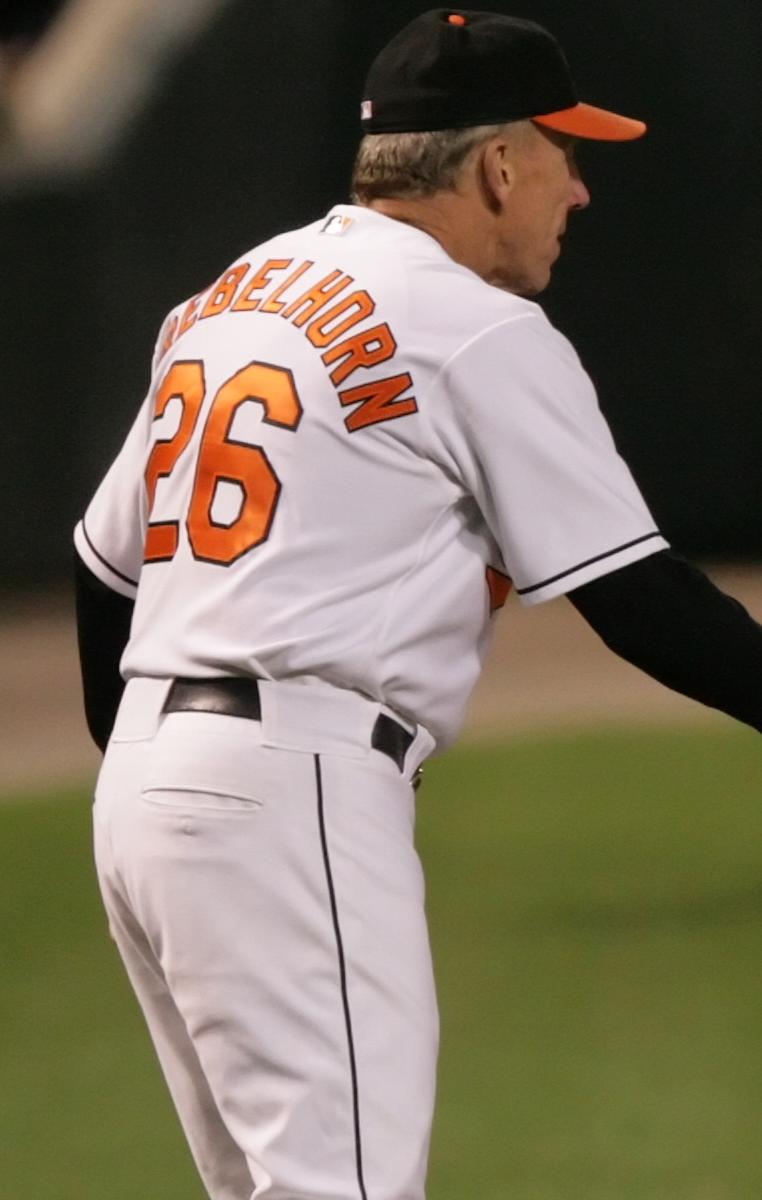
The first year the Rockies played was 1993. So when they were going to start, the manager was going to be Tom Trebelhorn, who had been the Boise manager with the A’s when we were at Eugene in 1975. And then I think he was in that league again with Greg. And they became really good friends.
And so when Tom was hired to — supposed to be hired to be the first manager or the Colorado Rockies, he called up Greg and said — and I remember Greg telling me the story — Tom said, ‘do you want to sleep in your bed? And coach third?’ and that was going to be a done deal. And then along came something with Bud Selig, and he was in there in town for a weekend or something like that. And on Monday, Don Baylor was announced as the manager. And Trebelhorn kept his job with the Orioles, and that was that.
But Greg would have been back in the game the very next year, after he’d been with the Padres. And probably would have been hired by somebody else to manage, and gone on and on. But as it was, he just kind of shut it down.
His son was in college playing, and then he really didn’t do anything until Larry Rothschild — an 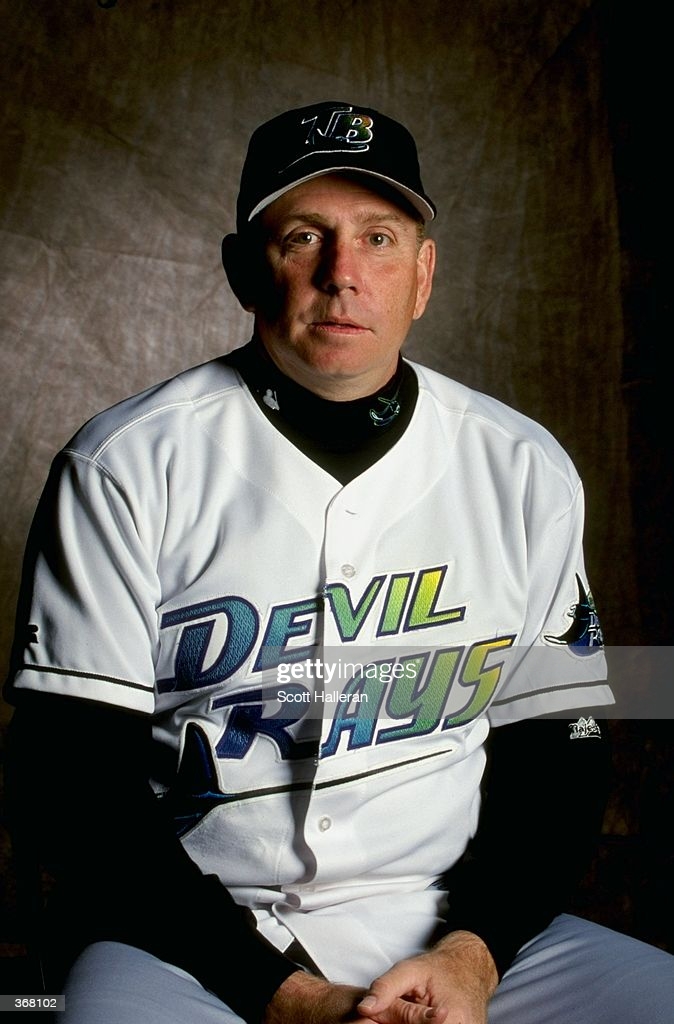 old Eugene Em — called him up and said, hey, I’m going to manage Tampa Bay. You gotta coach – I think he wanted him to be the bench coach. And then Frank Howard came onto the staff, and he became the bench coach. And Larry told Greg, hey, you need to coach third, which I don’t think Greg wanted to do, really, but he did.
old Eugene Em — called him up and said, hey, I’m going to manage Tampa Bay. You gotta coach – I think he wanted him to be the bench coach. And then Frank Howard came onto the staff, and he became the bench coach. And Larry told Greg, hey, you need to coach third, which I don’t think Greg wanted to do, really, but he did.
He was kinda Larry’s right-hand guy on a weird team. They had Canseco and Wade Boggs and some periphery-type players that weren’t easy to handle. And Larry was a rookie manager, and Greg helped him a lot, I know that.
JH When you are in an organization like the Padres were, and you see those changes, does that polarize the other people into where they’re McIlvaine Guys and Not? What does that do to the organization as a whole, when you see rampant change like that?
BM Well, yeah, I mean, you have to — first, for me, I’m in the minor leagues and trying to move up. So you can’t attach yourself too much to the people who’ve just left. And the new group, whoever it is that’s in there, you’re their guys, so you better let them know in every opportunity that that’s whose side you’re on, or that you’re on their team now. So I was very quiet.
And as I said, there were a few people that had been there with Greg, who — we would have private conversations about it, but we both knew, that’s as far as it can go. And I learned the new system from Joe McIlvaine. And his minor-league director was Ed Lynch, who had been a Met when McIlvaine was with them.
Ed and I got along great, and he liked me and was moving me. I told him I didn’t really want to manage in the minor leagues for a career, and I didn’t see myself as the next Greg Riddoch: a minor-league guy who made it to the big leagues. I said, I’m a hitting instructor, and that’s what I want to be. And next year, when you’re picking the jobs, I’d rather be a hitting instructor at a higher level than a manager at a lower level. So he took care of me a little bit that way.
And then when he went to the Cubs, he basically took me with him, and started me over there in 1996 as the AA hitting coach.
So I played the game; I played it the way you have to play it. But I was good at what I did, as far as that goes.
I mean, I was a good instructor and a good coach; I didn’t have issues with players. If I didn’t like [someone] we kept our distance, and made it factual and not personal. And I knew by then, I’d played in parts of 11 seasons as a player and by the mid-1990s, I was already 10 years in as a coach. So I knew what you do and what you don’t do.
So I was in the McIlvaine system as long as he was with the Padres, and then after that, it was Randy Smith. So then I was a Randy Smith Guy.
And when Ed Lynch moved to the Cubs, he took a few guys with him, and Randy wanted me to manage — kind of go back to the beginning — and he wanted me to manage the Rookie League team. And I told him, I said, gee, I really don’t want to be a minor-league manager. That’s not my goal. I had already moved up in the Padres organization as a hitting instructor. And so I said, even if I just keep the job at the same level, which at that point was the California League, which was close to home for me. So I was hoping to just keep that job, but he didn’t — he wanted me managing at the lower level. So —
JH Is that how you ended up with the Rookie League job in 1994?
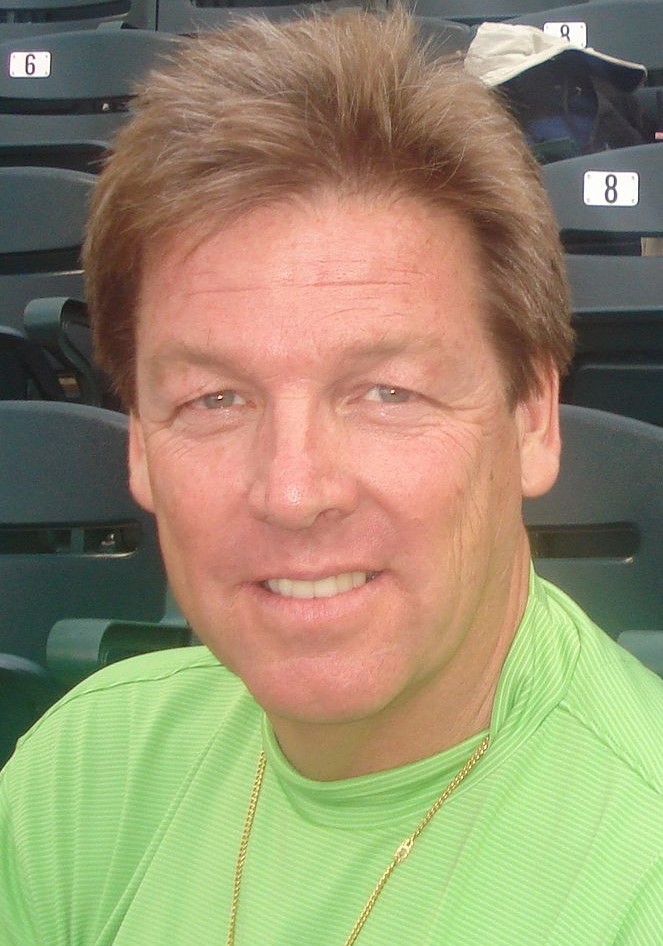
BM Yes. And then the next year Ed Lynch had by then become the — he had gone from the Padres to the Mets as the assistant general manager, I believe, and then from the Mets to the Cubs. And so he called up and told Randy — and they weren’t real, you know, they weren’t enemies, but they weren’t the best of friends either. Because you know, they kind of bounced around each other a lot — and Ed said, what are your plans for Barry Moss? And of course there was an intermediary coach who had been giving Ed the information that he needed and wanted.
So after I had signed and agreed to go back as the rookie-league manager, then Ed called up and said, I’ve got a better job for him as the AA hitting coach. And Randy Smith was pissed, because he thought he was kind of upended. So when I took that [managing] job, that was kind of the end of that deal. I don’t think that we — Randy Smith and I ran into each other a number of times after that. We were fine, as far as that goes. But —
JH What led you to gravitate toward the hitting-coach side of things more than field-managing? What appealed to you more about that?
BM I wanted to be in the major leagues. And so I didn’t see myself — I mean Greg Riddoch, who’s a one in a million — and I mean, to be realistic, one in a hundred, anyway — I mean, there just aren’t that many Earl Weavers, and Tony LaRussa at least got some big-league time in. Buck Showalter, later on. But you could count them on one hand, the guys who did not play in the major leagues and were lifers in the minor leagues and got real good major-league managing jobs.
So I saw that as a reality that, geez, I’ve already played 11 years, and gone from 1972 to 1984 in the minor leagues as a player. You really don’t want to do that all over again just to try to be a major-league manager and get bumped in two years, you know?
So I thought, and I felt I reached the players more individually and one-on-one with my work as a hitting instructor, and had some very good results. I had a couple of guys win batting championships, and that was more of a passion to me. And you kind of held your job a little bit longer. You know, even if they changed managers in the big leagues, they kept the coaching staff for the most part. And so that became my goal. And so I tried to create the opportunities as a minor-league coach to work as a hitting instructor.
And the managing was just not my priority. I didn’t have the passion for it that, say, Greg did. I liked running the games and — but you know, in the minor leagues, you have no control.
I mean, they take your best players away [laughs] when they win five games in a row pitching, or hit .300 or 10 home runs — there, there goes your All-Star.
JH [sarcastically] But it’s all about player development, right? [laughs]
BM I mean, sure. But then at the end of the year they went, ah, well, you had a losing record.
JH Yeah, sure! Thanks a lot!
BM It’s like, What do you mean, I had a losing record? You took away my two best pitchers, and my shortstop – so I knew how it worked. And at that point, I was in my coaching career in my thirties already, so it wasn’t like a Buck Showalter, who started coaching, or Gene Mauch, who started coaching at the age of 24 or 25 — or Greg Riddoch, for that matter. Thy were in their 20s, and when they got their chance to manage and be in the minor leagues, they welcomed it.
But for me, it was kind of okay, I still want to stay in it. My goal is to get to the major leagues, and that seemed to be the best way to go.
JH Well, you player-coached for a while, didn’t you?
BM In 1981-82-83 in Utica, I was a player-coach. In 1984, I was the hitting coach in Tampa, and we had a situation where the shortstop and left fielder and centerfielder all converged on a popup, and two of them were down and out. And so before they could get other players in, I had to hit for — I think I hit pinch-hit in three games. So I’m in the books in 1984 [6G, 6PA, 3AB, 1R, 1H, 1RBI, 2BB] but I was a coach, really. I just had to fill a roster spot till they got some other guys in.
JH You hit in Utica there. But it’s an odd thing to me, because you go from Walla Walla to Eugene to Three Rivers (AA). You get nine games at Indianapolis (AAA), and then you spend a bunch of time in different A-ball leagues after that. How did that reverse itself? What happened? I mean that you made it as far as Indianapolis, but then it turned around on you.
BM Well, yeah. I made the Indianapolis team, to start the year. But they didn’t use the DH in the Reds organization, so I was a pinch-hitter. I was the pinch-hitter. And who are you going to pinch-hit for? They had guys who’d played parts of two years in the big leagues on that club, playing the outfield and first base.
JH Yeah, I could see where you were really stuck. I did see where you had a AAA baseball card, 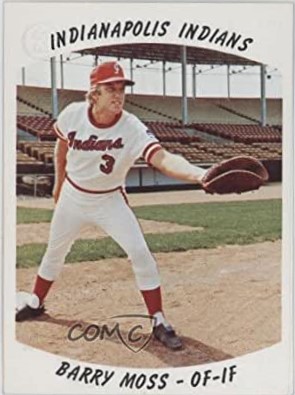 though. I did see that. [laughter]
though. I did see that. [laughter]
BM That’s right! First base!
It was probably about the first of May when they said, we want you to play, and there’s a spot opening up in AA, so we’re going to send you back to Three Rivers. So I went back there for the rest of that season.
Then the next year, there was the Rule Five draft deal going on, and Toronto was just starting. Toronto only had Dunedin in the Florida State League and Syracuse in AAA. That was their whole minor-league system. So I was in the draft, but I was not going to go to Syracuse.
I was in spring training in 1978 with Toronto. And I was trying to make the Syracuse club, and I nearly broke my ankle on a steal going into second, so I missed the rest of the spring and couldn’t go with the club to Syracuse. So they kept me in Dunedin, which is where their spring-training camp was, too. So then they activated me about the middle of May. And so I wind up going from AAA, AA, back to A-ball, cause that was their only club. And the deal was, they were going to send me to Syracuse as soon as I was fully healed and a spot opened up, which didn’t happen.
So I wound up playing the rest of the season there, in Dunedin, and then the Utica deal became their—that was their Short-A, a kind of rookie-league club. And so I was a player-coach for them there.
JH But it shows here — maybe this isn’t correct — that you played in 1978 in Dunedin and then there’s no record for 1979 at all, and then 1980 in Victoria. Then three years in Utah. What happened between 1978 and 1979?
BM OK, in 1979 I didn’t play. And then 1980, I played on an independent club in Victoria — I was trying to get a job as a coach. And the only way they would let me coach is to play.
JH Wow!
BM So I went there as a player and the deal was, I’m just gonna play a few games. I want the hitting coach [job] — and a friend of mine was the manager. And so once I got there, they didn’t have that many players — and I shouldn’t have, but I stayed and played.
And then the next year I was hired by Toronto to be a coach in Utica. And it’s kind of the same thing. By then, Toronto was not doing real well financially, and they were supposed to have had a AA team by then, and another — and I think they’d added an A club in the Carolina League or something. So they were real short on players, and they weren’t very good. So I went up there to be a hitting coach and a player, and they made me a player-coach. And so I just — each year I was just going to coach, and I wound up playing there.
JH You played a fair amount of games!
BM I really shouldn’t have; I had no business playing at that age and in that league. But I was trying to get to Syracuse, and you know, it was a chance to be a coach in the big leagues with Toronto. That’s what I was after.
JH .325, .317, .359. I know you’re 27 years old in A-ball, but still –
BM Yeah, I know. Yeah. I don’t go around boasting about that — I don’t bring that up very often. [laughs]
JH Well, your secret’s safe with me! [more laughter]
BM But the whole time, my priority was to be a coach, and that was my way to do it. And then in in 1984, that’s when they didn’t — I wasn’t offered anything by Toronto; by the winter meetings, they didn’t know what they were going to do. They were gonna send me to be the AA hitting coach, but they didn’t have a AA team picked yet.
And so I went to the winter meetings, and that’s when I had run into Greg, and then they hired me right then, cause I hadn’t been signed to do anything yet for the 1984 season with Toronto. So that got me back with the Reds.
JH So how did the transition come about that you end up with the [Salt Lake] Trappers in 1987 in those interim years? How did that work its way up?
BM At the end of the 1985 season, that’s when all of the Reds stuff came undone. Pete Rose was the manager, and then Bob Howsam left the club after that. And that was — what’s her name? Marge — ?
JH [emphatically] Schott!
BM — became the owner, and cut everybody. So there were basically — it was back to the 1960s, where you had a manager and a coach at each team. And sometimes, in some cases, there wasn’t even a coach, so the Reds were just stripped of everything, because she thought there were too many guys — too many coaches.
So I got bumped from my job, and then I went to Salt Lake and was friends with this fellow Van Schley, who was the guru of independent-league clubs. And so he’s from Malibu, California. And I’m a neighbor, in the San Fernando Valley, and knew him.
And so we crossed paths again there, and he said he had taken this team in Salt Lake because they — in, I’m gonna say 1985, I believe — the owner of the Salt Lake club had not made improvements to the stadium that were required by the Pacific Coast League. And the city of Salt Lake wouldn’t do it; there was a lawsuit or two or something about making these upgrades.
The Salt Lake Trappers were born in 1985 as a Pioneer League team, because there was no other franchise going there; they hadn’t improved the stadium for the Pacific Coast League. And Van Schley took charge of that and somehow sold the league president on, I’ll take the franchise, but it’ll have to be with my players. No co-op deal. I pick my own team and that’s what he did.
So at one point, somewhere in the 1986 season when I was out, I got with him and went into Salt Lake and helped with the hitters, and broadcast a few games, and that type of thing.
And then in 1987, along came Jim Gilligan, and I was supposed to be his [radio] commentator.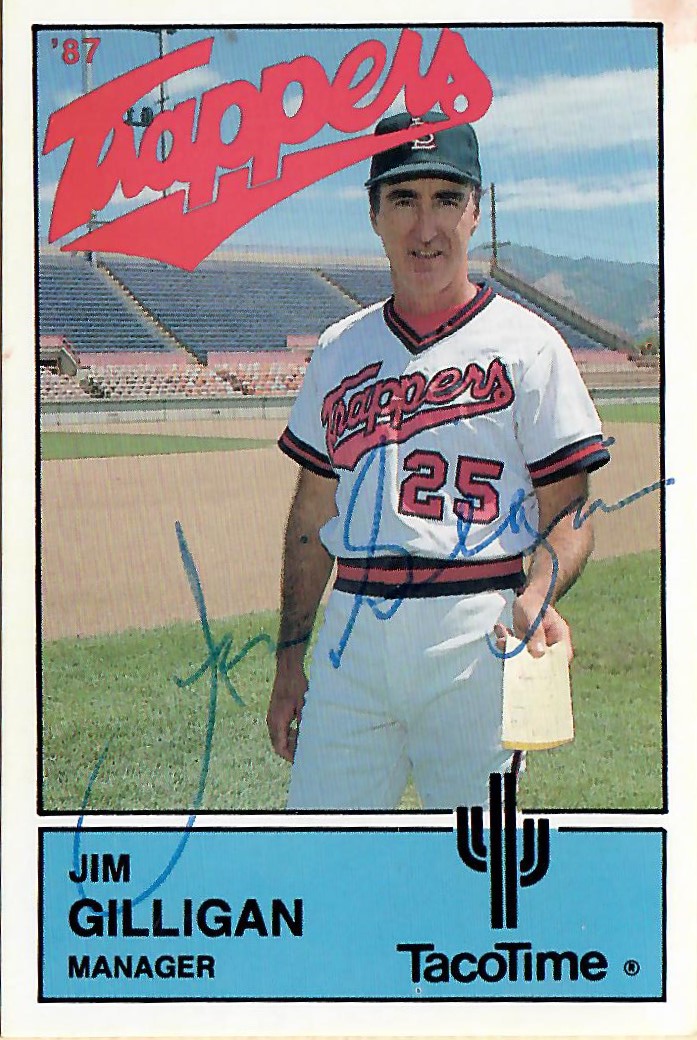
JH Working with Randy Kerdoon, right?
BM With Randy Kerdoon. And so we started that, and the team went 3-3, and Gilligan said, I 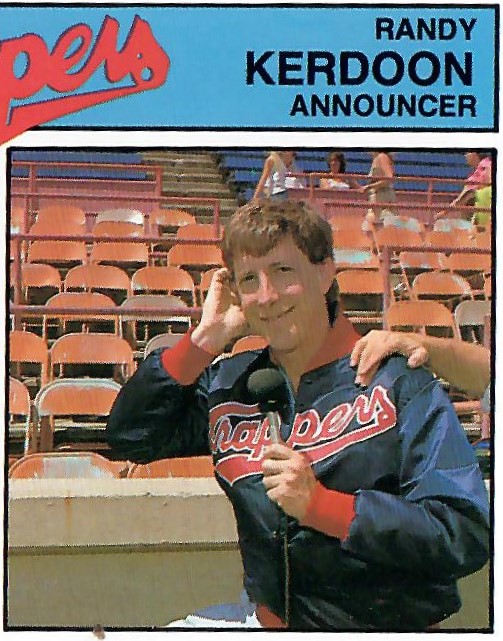 need you down here in the dugout for this series. Some big series was coming up; I don’t remember exactly who it was, but he wasn’t real thrilled with the start of the club, and needed a little help. Not strategy-wise or anything; he just wanted a coach’s presence in the dugout.
need you down here in the dugout for this series. Some big series was coming up; I don’t remember exactly who it was, but he wasn’t real thrilled with the start of the club, and needed a little help. Not strategy-wise or anything; he just wanted a coach’s presence in the dugout.
And I had already made friends with the players, and had been working with them, and then I do batting practice and all that, and then go take a shower and go up there and broadcast. So I had a great deal planned for the season.
And after six games, we’re 3-3. And so he says, why don’t you come down and sit on the bench here tonight? I did. And then we won. And then I said, well, I can’t go back up there if we’re going to win; I got to stay down here, so I did. Then that was my joke. And then after like three wins in a row, Gilligan says, okay, now you can’t go back up until we lose.
JH And a month later …
BM 29 games later, I got sent back up to the broadcast booth. So that was our inside joke. But –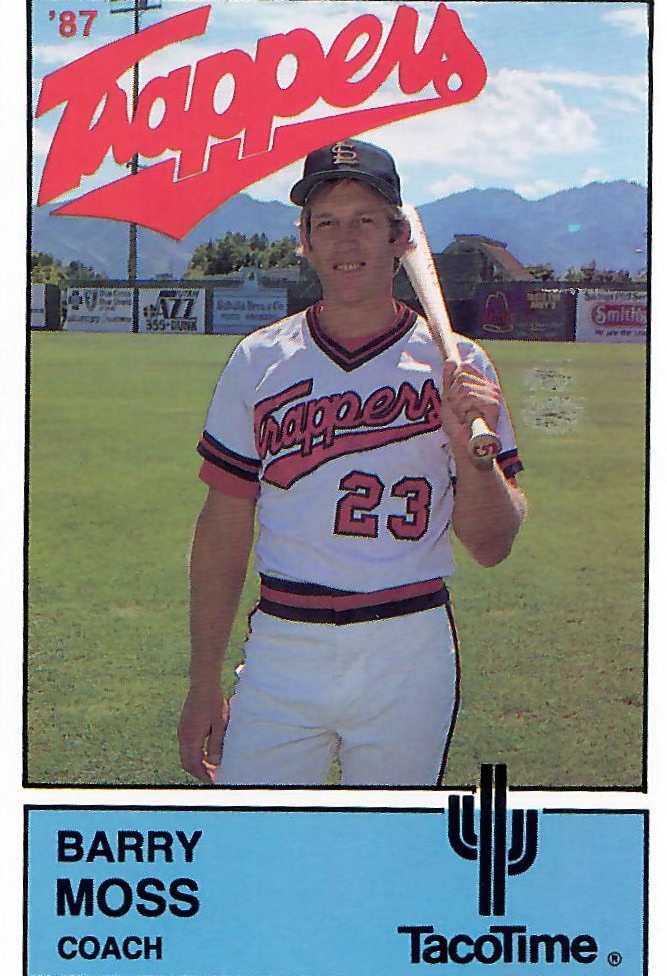
JH And 29 rounds of golf later, as I understand it?
BM — and we had to play golf every day. I think I threw that in. I said, okay, but we have to play golf every day. It’s a joke. And Gilligan, getting an invitation to play golf, well … we did it in the rain. We did it at night. We did it. I don’t think we played 29 days in a row, but close to it.
But in any event, that was my that connection with Van Schley and how I got in with the Trappers and Van had owned that team in Victoria in 1980. And so I played there that year trying to be a coach. And then got a job with Toronto, but then wound up playing. And I’m a guy, they had to take the uniform off of.
I shouldn’t have been playing in those leagues, and I’m kind of embarrassed that I did, but at the time, some guy, you know, old coaches I had been a player with, would come up to me — even Greg Riddoch was in that, had Eugene in that league, and he said, you’re still swinging the bat. Do you want to keep playing? Maybe we can get you AAA next year. So we had a good conversation or two like that. Jeez, you tell that to a guy who’s still running the bases and catching balls, you know, it’s tough to say, no, I just want to be a coach.
Transition from player to coach
JH What finally made the decision for you? What finally let you turn the page on playing?
BM Well, the Toronto deal. But when the 1983 season ended and I wasn’t being rehired, [and] a couple months had gone by and I didn’t have a job, so –and I wasn’t going to play, and they weren’t going to take — I think there was a conversation with Pat Gillick, who was a real great guy and treated me real well. He was the general manager of the Blue Jays. And I said — I think I pushed him, and at that point I was 27 or 28, maybe 29 even — hey, I want my shot in Syracuse. Am I gonna get to go there? And you know, I had gone to their spring-training camps and even been on the big-league roster in spring training. So he said, nope, Barry, we got Willie Upshaw, we got Jorge Bell. We got real good guys coming up: Jesse Barfield and he said, you’re not — we just don’t have anything in the outfield for you. And I’m trying to get you a coaching job that you want, but right now we just don’t have anything set.
So at that point I said, hey, look, I’m going to go ahead and start trying to send a résumé around and apply with other clubs then. Is that what I should do? And he goes, sure. And you tell them to call me for recommendations. So it was all on good terms and everything, but I didn’t have a job, and that’s when I finally hung them up on the wall and said, I’m not playing anymore. And then finally got the coaching job, you know?
JH I mean, you’re still on the path, it seems like. You’re still involved with the game and still  going there. You talk about tearing the uniform off a guy! It sounds like you’re going to be buried in one.
going there. You talk about tearing the uniform off a guy! It sounds like you’re going to be buried in one.
BM Yeah, well, it’d be okay if — the job I’ve had with the Dodgers was more of an independent-league-connection deal. They only call if there’s an emergency situation, where they got a guy hurt, or something like that. And they’ll say, hey, get us an independent guy who can play AA or AAA or something like that.
But yeah, I mean, I’ve still got some from some friends or some people that think I know what I’m doing, so —
JH Is this the California Winter League that you’re still involved with?

BM Yes. And then I do that every January, and that’s just a deal that, I’ve made friends with this guy who owns the operation in Palm Springs. And so it’s 150 players that pay their way to a – it’s usually a 30-day deal, and they play 20, 25 games where there’s a playoff round in there. And these guys are all trying to get signed by independent-league teams or major-league organizations, but there’s only maybe one or two that get taken by an organization each year.
And so these guys are all college guys that didn’t get drafted, or independent players or some organization players that have been released or are looking for a club. And so it’s good.
If there’s any kind of a relation to Greg on that, it’s [that] Greg was a teacher, and passed up on many opportunities when he was younger to keep teaching. And he was good enough in the game, and smart enough to — when he did get the opportunity — to move up and let go of the spring teaching job. He got his way to the big leagues.
JH He still considers himself a teacher more than anything.
BM I like the feeling of helping these kids. Of those 50 that get jobs, maybe 10 get picked up by organizations, but I’m not doing it for that reason solely. It’s not realistic that I’m really helping these guys advance, but I’m giving them the chance, and it’s a month in Palm Springs in January, and my wife comes down and spends some of the time with me, and it’s my “fix” still. And in the beginning of it, the Dodgers said, hey, this is good. We’ll take a couple of your players, which they have. And so it’s kind of a fix.
JH You’ve been doing this for several years, haven’t you?
BM Seven.
JH Is that an adequate baseball fix for you, or how do you deal with the rest of the year?
BM Yes. And then, this guy also has a collegiate league in Palm Springs during the summer — collegiate league that he called the Southern California Collegiate League. And so I was the 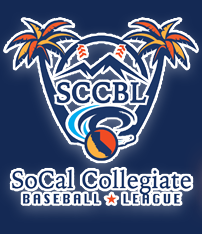 commissioner of that for a few years when they needed a neutral guy in there. And I knew a couple of the other owners of the collegiate-league teams from the past. And so I’ve helped them out with stuff like that. And I can stay at my house and commute to wherever I need to. So it’s not like a have to pack up and ride a bus for a season in the minors. So this is kind of an easy deal for me.
commissioner of that for a few years when they needed a neutral guy in there. And I knew a couple of the other owners of the collegiate-league teams from the past. And so I’ve helped them out with stuff like that. And I can stay at my house and commute to wherever I need to. So it’s not like a have to pack up and ride a bus for a season in the minors. So this is kind of an easy deal for me.
JH The more guys I’ve talked to, the travel gets them as much as anything else. It’s like, I don’t want to ride buses anymore or I don’t want to travel at all anymore. I did that for X number of years and I’ve just had enough of that. They still love the game, but the rest of it — you can pretty well have it. That seems to be the consensus.
BM Yeah. And this winter-league deal is — for me, it’s fun. I get to stay in touch with all the coaches that are there are; the deal is they have to be affiliated with an independent-league club, and they have to pick at least a player or two from the camp. So these guys pay 3,000 bucks, they get all their expenses for a month. But if they play decent, they at least get a chance to go to an independent-league club.
And so I get to stay in touch with these guys, and from a professional standpoint, if I do need a player or something there, I can get one with a phone call. And in many cases, I’ll have seen the players too, so that’s worked out well.
And then I get buddies of mine — like [former MLB cathcher] Matt Nokes lives here in San Diego, and I get him in there to speak and work with the hitters and catchers. And Rob Deer was our guy this year, and I’ve had Wally Joyner come in there. Steve Garvey lives down there in the winter, so he likes to come by and give a little lunchtime pep talk to everybody and remind everybody who he was. [laughs]
These poor guys, these kids nowadays, they don’t know anybody. They don’t know a guy who’s played five years ago, much less Steve Garvey or Johnny Bench — who’s been out too — and it’s tough, because I have to introduce these guys. And then once they start speaking, these guys are glued to them, and they’re willing to take them down to the batting cage.
Johnny Bench said — we just thought he’d stand around the batting cage. He lived down there at Mission Hills, and actually asked to come, because he’d read that some of these other guys were invited. And so he says, let me check you guys out. So he walks down there, and then halfway through the batting-practice session, he goes, well, you’re – and he knew me actually from years before with the Reds, because I told him who I was, that I’d been in camp as a minor-leaguer when he was there.
So he said, so you’re running this? Get me the catchers. Line them up. So for an hour, they got Johnny Bench working on their framing the ball or setting targets, hiding signs. And unfortunately, of the 18 catchers that were there, only half of them probably knew that Johnny Bench was a major-league guy, much less the best catcher of all time. I made sure they did know who was talking to them. Unfortunately, if they took a – raise your hands. Do you know who I am? — half of them would have looked at him with a dumb face.
JH That’s a shame. But it sounds like you started out in baseball networking when you were looking for a job, and you’re still networking today, helping other people get jobs.
BM You know, that’s kind of the way it goes. I wish I was making more money at it, but it’s okay. We’re in a good situation.
JH Are you reasonably satisfied with the career arc, as it turned out?
BM Yes. I’m going to say yes. I didn’t get where I wanted to as a player or a coach — and that would have been time in the big leagues.
I got this: Jim Riggleman let me sit on the bench there for the last series that they had in San  Diego. One year he was managing, and I got to do that. And then I was the hitting coordinator for the Marlins five years ago. And so I got to sit on the bench with them, with Ozzie Guillen as the manager, no less. So that was an entertaining series.
Diego. One year he was managing, and I got to do that. And then I was the hitting coordinator for the Marlins five years ago. And so I got to sit on the bench with them, with Ozzie Guillen as the manager, no less. So that was an entertaining series.
JH Never a dull moment there!
BM Yeah! So I got a few games, to say, hey, I sat on a big-league bench in a big-league game. But anyway, that was far short of what my goals were. But I’m very happy to still be involved in baseball, and to have made all the friends I have, and to get connected with a Greg Riddoch and Jim Gilligan; it’s all good. I’m very happy with the way it’s turned out.
